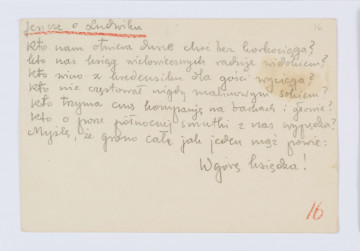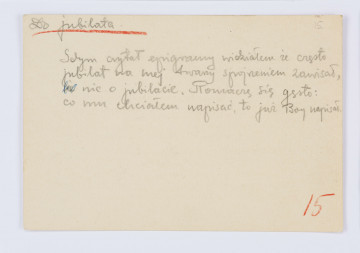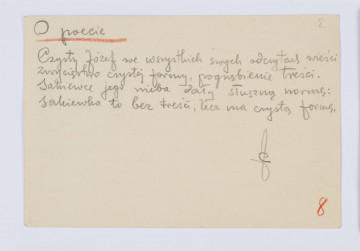
More about Ludwik
1930
National Museum in Lublin
Part of the collection: Józef Czechowicz
The protagonist of Józef Czechowicz's short story is Antoni Madej (1899-1989), a poet, translator and teacher. According to Tadeusz Kłak, he was "a co-founder of the poetic revival in interwar Lublin and an active participant of literary life in the city". He studied Polish philology at the Catholic University of Lublin, and graduated from the Higher Teacher Training Course. He was involved in pedagogical work in Lublin. He edited "Ognisko Nauczycielskie" and "Mały Płomyczek" (rural), from 1937 onwards. (rural), from 1937 he edited the magazine "Zet" together with Jerzy Braun. In 1939 he moved to Warsaw. He published collections of poems: Płonące lonty [Burning Fuses] (1931), Pieśń o Bałtyku [The Song about the Baltic] (1932), Widnokrąg [The Horizon] (1933), Twarz [The Face] (1934), W grudzie ziemi [In a Lumpp of Earth] (1934), Linie i granice [Lines and Borders] (1935) and Drzewo figowe [The Fig Tree] (1938), and a volume of translations of Z poezyj Otokara Brzeziny [From the poetry of Otokar Vrzezina] (1936).
Józef Czechowicz and Antoni Madej became friends during their joint activities in the Union of Lublin Writers and in the magazines with which they collaborated: "Zet", "Pion" and "Płomyk". In his work, Madej used some of the experiences of the Lublin avant-garde; we can find poetic influences of the Czechowicz school in it. The "Emperor of the Avant-Garde" noticed the literary values of the poems of the author of Widnokrąg. In a review of Madej's new book, discussing two volumes: Twarz and W grudzie ziemi, he even proclaimed the appearance of a new poetic personality in Lublin: "In provincial Lublin, among medieval walls and suburbs living from dawn to dawn, a poet-creator has sprung up.
A rich collection of Czechowicz's letters to Antoni Madej, kept in the Museum of Józef Czechowicz, as well as the poet's trifle Na 5-ro dzieci Madeja [For Madej's 5 Children] (the poet had five daughters, which was often the subject of the colleague's jokes) are a testimony to the cordial relations between the two poets.
In 1936, as the result of denunciations and accusations of immoral lifestyle (among others, homosexuality), Czechowicz was forced to resign from his work in the magazines and publications of the Union of Polish Teachers. The poet believed (as it later turned out, wrongly) that it was his close friend, Antoni Madej, who accused him of immoral acts. Madej wrote extensively about this case in an article entitled Wokół sprawy odejścia Czechowicza z ZNP, czyli bajka o straszliwym zbóju Madeju [Around the Case of Czechowicz's Leaving ZNP, or the Tale of the Terrible Madej, the Robber], published in "Kamena" in 1968.
Author / creator
Dimensions
cały obiekt: height: 15 cm, width: 10 cm
Object type
manuscript
Technique
manual script
Material
cardboard, pencil
Creation time / dating
Creation / finding place
Owner
The National Museum in Lublin
Identification number
Location / status

1930
National Museum in Lublin

1930
National Museum in Lublin

1930
National Museum in Lublin
DISCOVER this TOPIC
Museum of King Jan III's Palace at Wilanów
DISCOVER this PATH
Educational path